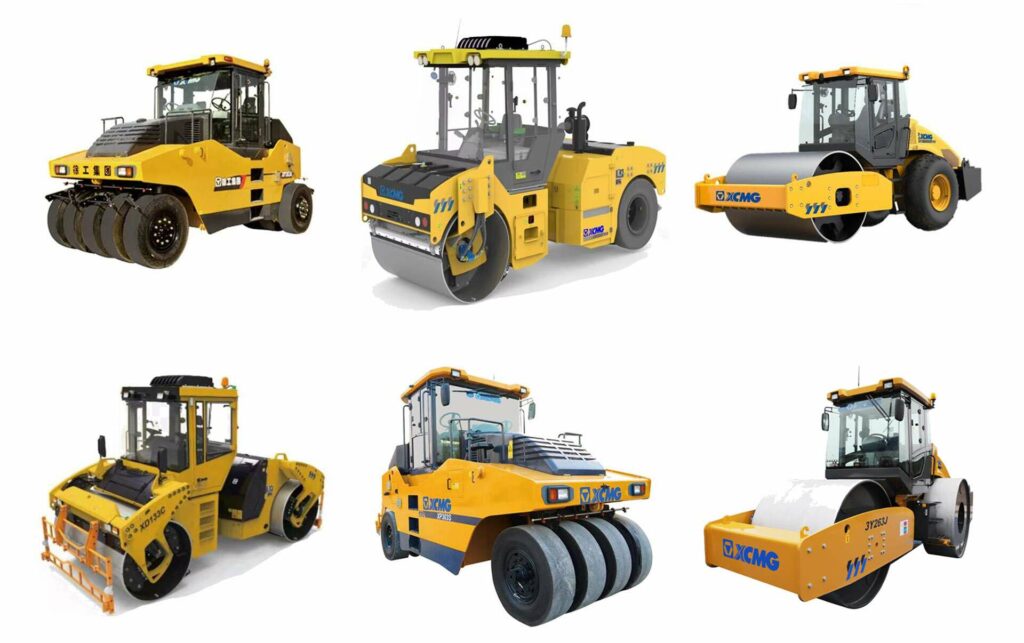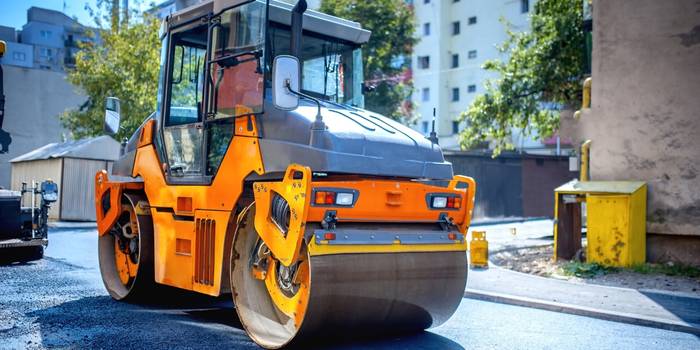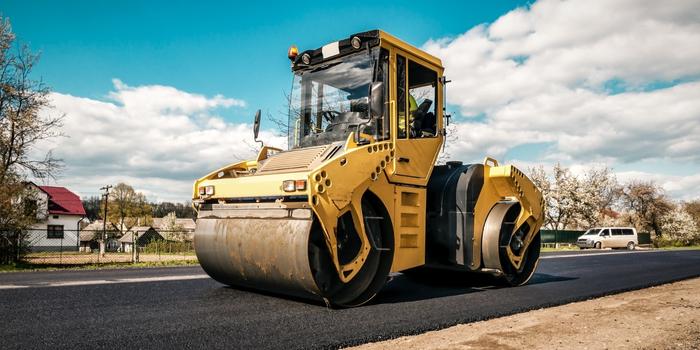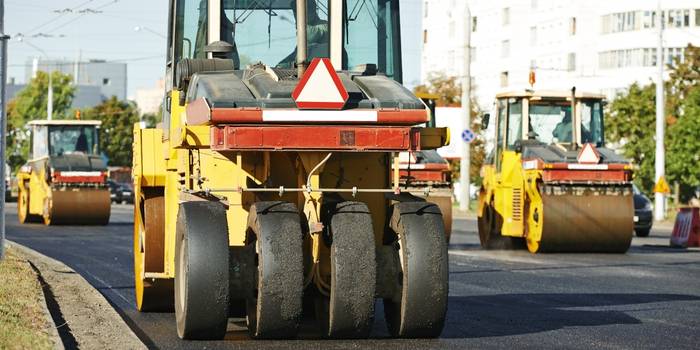Construction work requires strong and even ground. But do you know how civil engineers build smooth highways and pavement? Actually, special types of equipment are used for this purpose. These are called road rollers.
Today, you will learn the popular types of road rollers and their features. We will also tell you how to select the perfect roller for safe and long-lasting roads.
Major Types of Road Roller
In road construction, loose soil and materials with air gaps can cause problems later. Construction professionals and workers use different types of road roller. Each type has its own applications and properties. Below are major types of rolling machines.

1. Vibratory Road Roller
Vibratory road rollers are used when you need strong compaction. It has a vibrating component that shakes while pressing the ground. This vibration tightly sets the soil and asphalt with fewer gaps.

You mostly see this type of rollers when building highways, airports and big roads.It also works well on gravel and crushed stones which makes the surface strong and stable for building.
Types:
- Single Drum Rollers: This machine consists of one steel drum in the front and wheels at the back. Generally, it is used for smaller projects such as roadsides, driveways and paths.
- Combination Vibratory Rollers: Basically, combination vibratory rollers use both a steel drum and rubber tires. As a result, you will get strong compaction from the drum and smooth finishing from the tires. It is the best option for the compaction of asphalt.
- Double Drum Rollers: In contrast to single drum rollers, it has two steel drums. You will find one in the front and one at the back. Both drums used to press and smooth the ground at the same time. Double drum roller also known as tandem roller. This type performs well on asphalt roads, highways and large paving work. Following are two further types of this roller.
- Vibratory Tandem Rollers
- Smooth Tandem Rollers
2. Static Road Roller
The working of a static road roller is entirely based on its heavy drum. It has no vibrating parts, so compaction is only done by weight of the roller. Its large steel drums push the material down evenly. In this way, you will have a firm and strong highway surface. Further, you can use it for your small and medium construction projects such as roads, parking lots & pathways.

Varieties:
- Smooth Wheeled Rollers: This is a heavy machine used to make roads and pavements flat. These rollers have big and smooth metal drums. They can compact soil, gravel, sand or asphalt. You can find them with one drum (three-wheel) and two drums (tandem) also.
- Grid Rollers: It operates with a drum which has a grid pattern. You can use this roller to break large stones and press soil/gravel deeply. It makes your ground strong and stable. Grid rollers will be your ideal choices for road bases, highways and large construction projects.
- Cylindrical Road Roller: Basically, it is a small, lighter and walk-behind machine. You have to push it by hand. With its round drum, you can compact asphalt, gravel and soil. Its drum is usually about 1 meter wide and made of iron, stone or concrete.
- Padfoot Rollers (Tamping, Sheepsfoot Rollers): These rollers have drums with raised pads or bumps. These bumps press deeply into the soil and push out air pockets. In this way, they compact the soil evenly. Plus, you can adjust its weight and speed to get better compaction.
3. Pneumatic Road Roller
Instead of steel drums, the pneumatic road roller has many large rubber tires in a row. Its rubber tires press the surface while slightly rolling and kneading (moving material back & forth) it. In this way, the roller fills gaps and removes air pockets.
Mostly, you will often see it used on highways, city roads, parking lots and airport runways. Moreover, you can adjust the pressure and weight of the tires as per requirement. This gives you better control for different materials and layers of pavement.

Types:
- Grid Rollers With Pneumatic Tires: Along with rubber tires, these rollers also have a drum with a grid pattern. You can use them to compact highway pavement and loose rocks deeply. Actually, the tires press evenly while the grid drum breaks large clumps, which create strong and stable ground for road construction projects.
- Vibratory Pneumatic Rollers: These machines move with rubber tires and use light vibrations to press the surface more effectively. Civil engineers use them to fill gaps and remove air pockets. You will get smooth, stable and durable roads by the use of these compactors.
4. Specialized Road Roller
Specialized road rollers are built for your specific jobs where regular rollers may not work well. You will find some unique features in these types of road compactors. For example: different drum shapes, rubber tires and adjustable weights to handle soil, gravel asphalt in a better way.
Additionally, you can trust them on tricky surfaces (winding roads), narrow routes and construction areas with unusual materials. Also, some are designed for bridges, tunnels & airport runways compaction. But, others help press loose and uneven ground in a challenging work environment.
Categories:
- Landfill Compactors: Landfill rollers are heavy machines built to press and crush waste at landfill sites. You can use them to create dense garbage layers and reduce air spaces in soil. They operate with large spiked wheels that break down and flatten the waste. It makes your landfill safer and easier to manage for further work.
- Chip Spreader Rollers: These machines are designed to spread small stones and chips evenly on a road surface. They mainly used to make roads smooth, stable and create a firm base for roads. However, you can also use them to level and compact the material before adding pavement layers.
- Trench Road Roller: Trench roller will be your ideal choice when you need to build roads in narrow spaces. For example: you can use them in trenches and small construction areas. With its vibratory drums, you can compact soil where large rollers cannot fit.
- Reclaimer & Stabilizer Rollers: Stabilizers are heavy machines used to mix and compact soil, gravel as well as old asphalt. You use reclaimer rollers to rebuild and make stable existing roads. Together, they work well to prepare new road foundations for construction.
How To Select the Right Road Roller?
-
Construction Needs
You first need to consider your project requirements. Different road types such as parking lots, highways and small paths need unique compactors. Also, the soil must be the right density and have the right moisture level. Hence, you should pick a roller that can achieve these conditions too.
-
Type of Soil
Well, the type of soil on your construction site also affects which roller you should choose. For example: soft, clay and loose soil may be well pressed with padfoot or sheepsfoot roller. However, for gravel and asphalt, you can go with smooth or tandem rollers.
-
Project Size
You must keep in mind the size of your project such as how long it will take and how much compaction is needed. Small projects like driveways or paths can be set with light compact rollers.
For large highways, you will require heavy & powerful rollers. In this way, you can select the right roller and decide how many machines you need for the work as well.
-
Compaction Depth
Actually, compaction depth is the thickness of the soil and material layer that a roller can press at one pass. That’s why you should choose a roller that matches the depth required for your project.
If you work with shallow layers, a light or single-drum roller works well. For deeper layers, You can trust heavier rollers or vibratory types. For such conditions, these rollers will provide better compaction.
-
Work Efficiency
Your project timeline also matters in selection of road compactors. You have to pick a roller that matches your project deadline. Larger, heavier and vibratory rollers can finish your big projects faster.
On the other hand, smaller rollers work well for tight spaces or small areas. In short, when you choose an efficient roller, it will save time, fuel and effort for proper compaction.
Road Roller Uses
During road construction, you can use different road compactors for many purposes. Below are some major applications of these machines at your work site.
Soil Compaction
The main application of road rollers is to compact soil before construction. With its use, you can press the ground to remove air gaps and loose particles. So that road can be built on a strong surface.
Ground Leveling
Road rollers level the ground for building projects. They flatten uneven soil, gravel & sand to create a smooth surface. As a result, you can easily construct roads due to uniform pavements and foundations.
Gravel Compaction & Asphalt Smoothing
To achieve proper compression of gravel and asphalt layers, you can use road rollers. These machines press the stones together to minimize extra gaps in materials. It creates a strong and stable layer of gravel for driving/paving on top.
Base Layer Strengthening
Before pavement of highway, you can make building foundations strong and resist any damage/cracks. Road rollers compact each layer of material and make your paths firm that can carry heavy traffic easily.
Landfill Compaction
Sometimes, landfill areas are used as a base for roads (in reclaimed or filled land). These unsettled surfaces can be unsafe and crack over time. To solve this issue, you can use special types of road rollers to prepare these types of locations for well compaction. It makes your ground stable enough to support pavements for a long time.
Final Note
So, you have good knowledge about all main road roller types and their applications. To get quality results, you must match the right roller with soil, materials and your project requirements.
We are experienced in the road construction industry for 18+ years and supply quality road safety products worldwide. You can talk to our professional for your inquiries and quick quotes on products.


-80x69.png)

